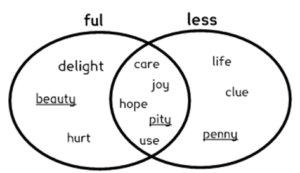20 September 2019
This week, all the spellings contain a soft c. The letter “c” has two sounds, hard “c” and soft “c”. The hard sound of “c” occurs most often. (cat)
When “c” is followed by (a, o, u) it is sounded as “k” (hard c).
When “c” is followed by (e, i, y) it is sounded as “s” (soft c).
- race
- ice
- cell
- city
- fancy
- police
- circle
- pencil
13 September 2019
Next week, we’ll be learning about the j sound at the start and in the middle of a word. It is usually spelt with a g before e, i and y and with a j before a, o and u.
| gem |
| giant |
| magic |
| energy |
| jacket |
| jar |
| join |
| adjust |
06 September 2019
This week’s spellings relate to the ‘j‘ sound at the end of a word. They will be tested on Friday 13 September 2019.
The j sound is spelled -dge straight after short vowel sounds (eg badge – the ‘a’ is making a short sound) and -ge (eg change – the ‘a’ is making a longer ‘ay’ sound) after all other sounds.
| badge |
| edge |
| bridge |
| fudge |
| charge |
| huge |
| change |
| village |
Take a look at our spelling guide for some suggested methods for learning these spellings.
12 July 2019
This week, the spellings are some of the trickier words from the Year 2 list.
| everybody |
| beautiful |
| hour |
| improve |
| sure |
| sugar |
| clothes |
| water |
| people |
| Christmas |
05 July 2019
This week, the spellings all end in -tion.
| station |
| fiction |
| motion |
| national |
| section |
| action |
| emotion |
| portion |
28 June 2019
We’re learning about the -ment suffix in phonics next week. When the suffix -ment is added to the root word, which is usually a verb, the new word becomes a noun.
| equip equipment |
| treat treatment |
| excite excitement |
| move movement |
| enjoy enjoyment |
| improve improvement |
| punish punishment |
| entertain entertainment |
21 June 2019
We’re learning about -ness suffix in phonics next week. Be careful with the first spelling, happiness, as you have to drop the y for an i before adding the suffix. For all the others you just add the suffix on to the root word.
| happy happiness |
| sad sadness |
| kind kindness |
| quiet quietness |
| dark darkness |
| ill illness |
| shy shyness |
| sick sickness |
14 June 2019
The spellings this week can all have the suffix -ful or –less added to them (some can have both). The underlined words have an extra rule to follow when adding the suffix: drop the y for an i.

07 June 2019
This week, we’re revisiting the -ed suffix which is often used to change the form of a verb to the past tense (eg walk to walked).
Children often make mistakes with this suffix. For example, walkt or walkd.
| grinned |
| dropped |
| stumbled |
| confused |
| hurried |
| tidied |
| groaned |
| splashed |
17 May 2019
This week, we’re focussing on alternative ways to spell the oo phoneme. Children will be tested on eight out of the ten words.
| June |
| rule |
| Tuesday |
| rescue |
| knew |
| threw |
| flew |
| grew |
| doom |
| too |